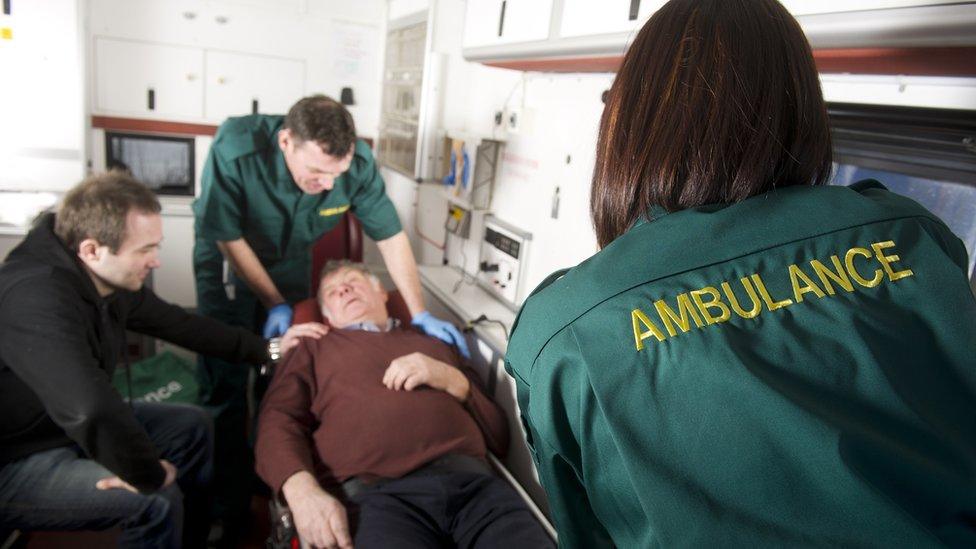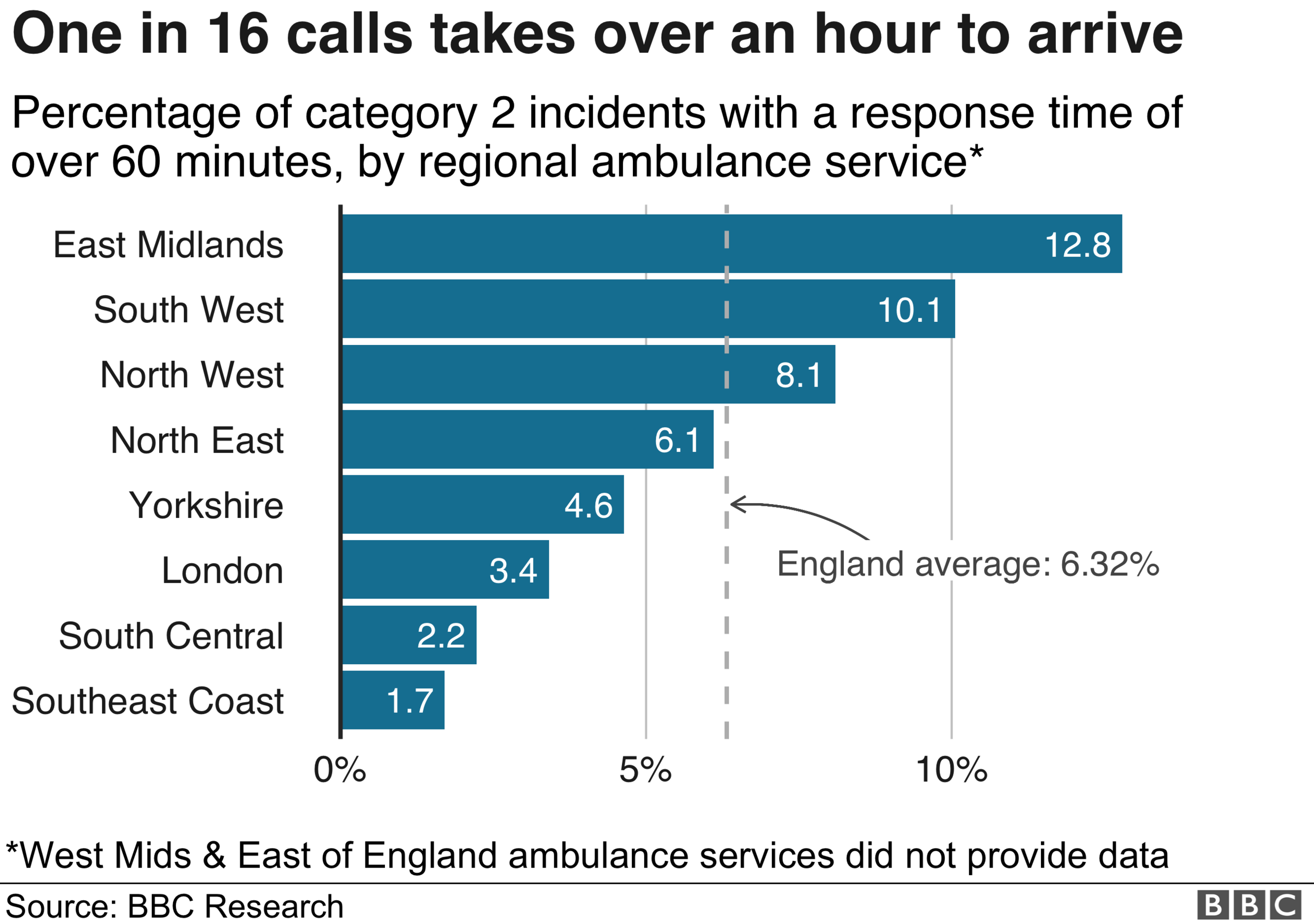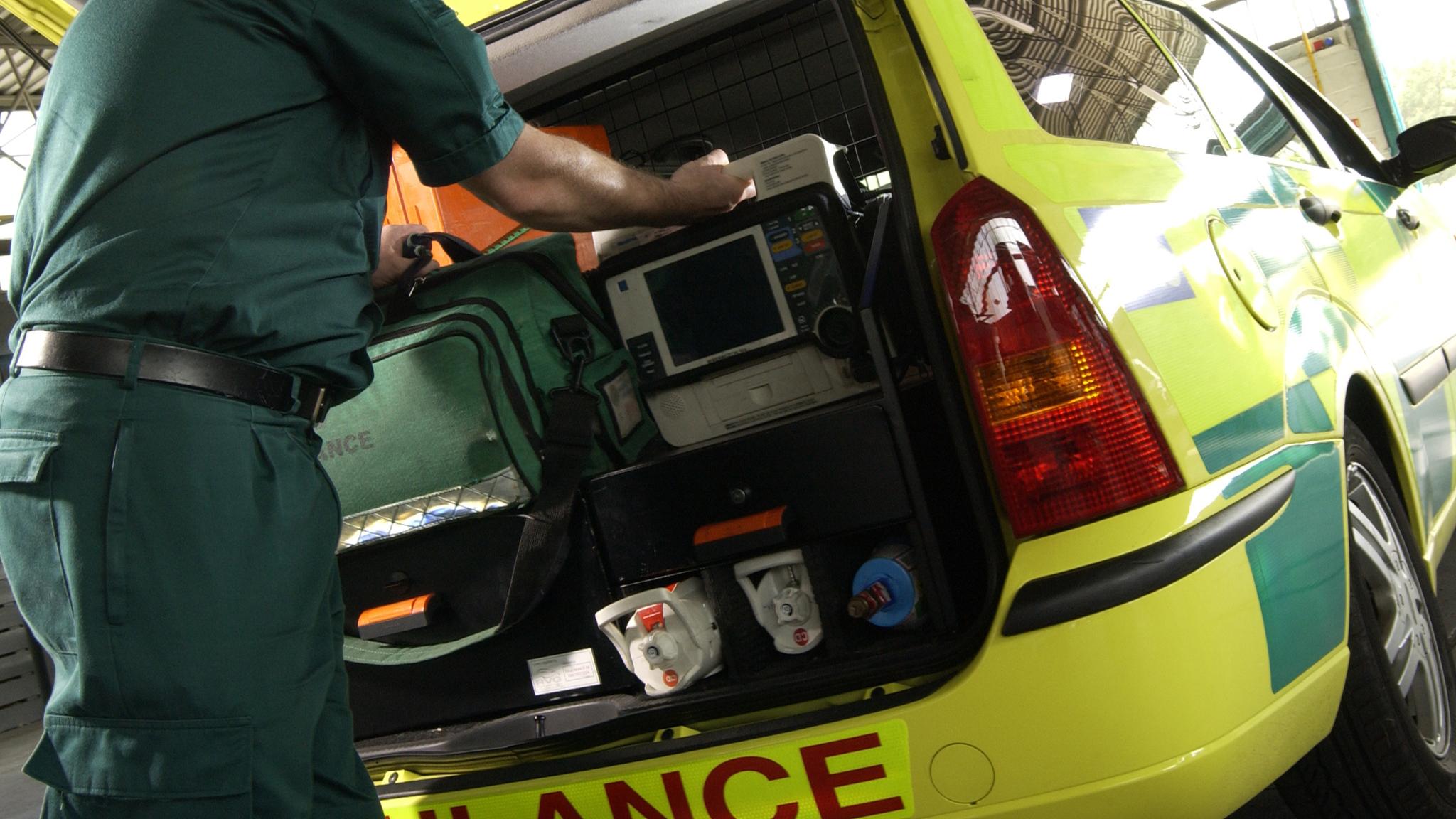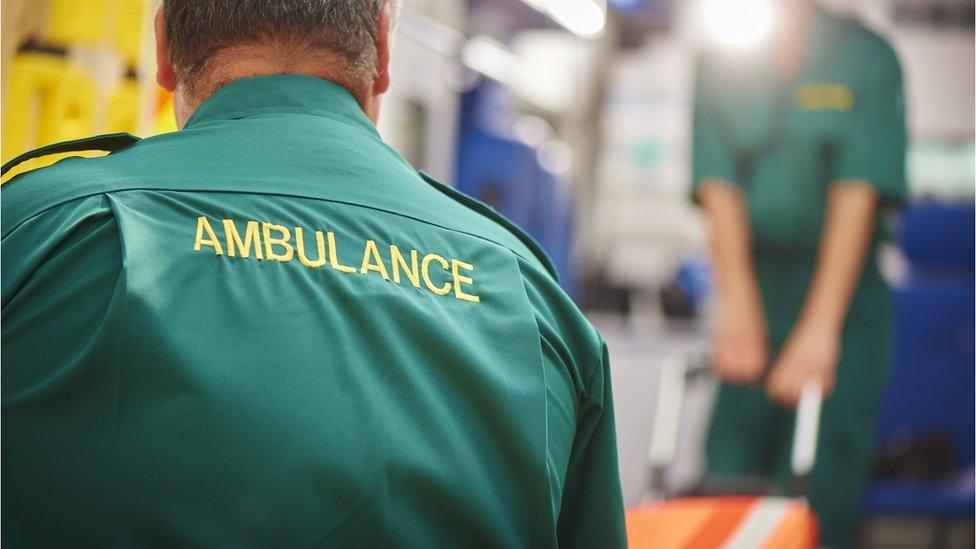Seriously ill wait more than hour for ambulance
- Published
- comments

Heart attack, stroke and burns victims are among the seriously ill and injured patients waiting over an hour for an ambulance to arrive in England and Wales, a BBC investigation shows.
The delays for these 999 calls - meant to be reached in 18 minutes on average - put lives at risk, experts say.
The problems affect one in 16 "emergency" cases in England - with significant delays reported in Wales.
NHS bosses blamed rising demand and delays handing over patients at A&E.
Many ambulance services have increased staffing - only to find the extra resource largely being swallowed up by the rise in delays faced by crews queuing outside hospitals.
This has meant they have had to prioritise the most serious "immediately life-threatening" cases, such as cardiac arrests.
But these represent just a small proportion of the high-priority 999 calls.
Some of the longest waits for the next most serious level of calls, including those having fits as well as heart attack, stroke and burns victims, exceeded five hours.
'My partner died while waiting'
Mark Mitchell says his partner Derrin died while waiting for an ambulance
Derrin Cozart, 55, was at home in Northumberland on his own last year when he collapsed. He came to and rang 999.
That was the last time anyone spoke to him.
It was over an hour before an ambulance crew arrived. By the time they did, he was dead.
He had suffered a gastrointestinal haemorrhage, which causes internal bleeding.
Thirty minutes after his call the ambulance service had rung back, but could not get hold of him.
It took another 48 minutes for paramedics to reach him - two crews had to be diverted while they were on their way.
His partner, Mark Mitchell, was out of the country on business at the time.
"It was devastating. I've been left wondering if the ambulance had got there more quickly he may have survived.
"We just don't know - and that's heartbreaking."
The North East Ambulance Service said a full investigation was being carried out into the case.

Patients 'let down badly'
Waiting for ambulances: "The system is beyond a joke"
The BBC investigation, which used the Freedom of Information Act to obtain data, has also uncovered other worrying cases.
These include 70-year-old Dave Jones, from Shropshire, who waited more than two hours for paramedics to arrive after suffering a heart attack.
His daughter, Rebecca Jones, said they were "frantic with worry" while they waited for the ambulance.
"We called back several times to check he had not been forgotten. The NHS is just so stretched - the staff are doing the best they can in impossible circumstances."
In a joint statement, the hospital and ambulance trust apologised for the delays.
Rachel Power, chief executive of the Patients Association, said patients were being "let down badly at their moment of greatest need" and getting a quick response could be "a matter of life or death".
She said the delays were "undoubtedly" related to the sustained underfunding of the NHS.
Mark MacDonald, of the Stroke Association, described the findings as "alarming", saying a quick assessment and transfer to hospital for brain scans was vital if a patient was going to make a good recovery.
"When stroke strikes, part of your brain shuts down. And so does a part of you. Around two million neurons are lost every minute that a stroke is untreated."
How many long waits are there?
The BBC asked for long waits for the two highest priority groups of 999 calls - the immediately life-threatening category ones and the emergency category two cases - from the start of 2018 when a new system of measuring response times came in.
Two of England's 10 ambulance services - the West Midlands and East of England - refused to provide the information.
Long waits for immediately life-threatening cases were unusual - just one in 270 cases took longer than 30 minutes to reach. That works out at less than 40 a week.
But the records for category two call logs showed long waits for these emergencies were much more common.
The data showed there were 385,000 waits of over an hour from January 2018 to September 2019 out of just over six million incidents responded to.
That works out at more than 4,000 a week on average - or one in 16 calls.

East Midlands Ambulance Service had the greatest number of long delays - one in eight calls took over an hour.
Director of operations Ben Holdaway said crews were often facing long waits at A&E to hand over patients which means they "haven't been able to get back on the road quickly".
"Every part of the system wants to tackle these issues, but it's clear we need more staff and beds and well-functioning social care."
In Wales there were more than 1,000 cases a week on average - nearly a quarter of callouts - although their second-tier emergency calls category is a little broader than England's and includes less urgent cases like diabetes complications which could account for some of the long waits.
Lee Brooks, from the Welsh Ambulance Service, accepted that some patients were waiting too long, describing it as as "frustrating for staff as it is for patients".
Ministers are in the process of setting up a taskforce to tackle the delays.
Comparable data was not available in Scotland or Northern Ireland.
NHS national ambulance adviser Anthony Marsh said: "It is not easy to reach everyone as quickly as we would all like. All our staff are working flat out."
The Department of Health and Social Care in England said the government was increasing funding for the health service and had set aside a dedicated pot to invest in ambulance services.
It also said it was investing in the workforce - from September student paramedics will be entitled to a £5,000-a-year grant to support them during their studies.
Data analysis by Felix Stephenson and Christine Jeavans
- Published30 November 2016

- Published29 November 2016

- Published30 November 2016